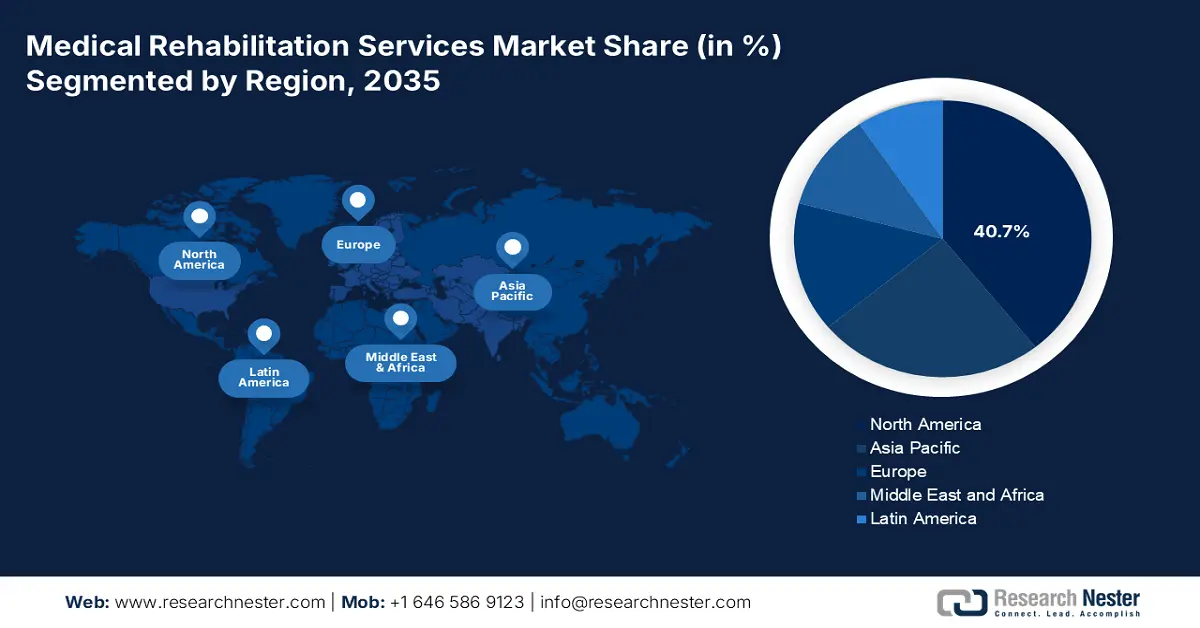Medical Rehabilitation Services Market Regional Analysis:
North America Market Statistics
North America industry is anticipated to hold largest revenue share of 40.7% by 2035, primarily due to a robust economy, advanced technological infrastructure, and high investments in developments. Additionally, it hosts a huge, diversified consumption base and rich purchasing power to drive demand for goods and services. An additional incentive to the growth process is the availability of global leadership in corporations, deep financial markets framework, and favorable regulatory environments. Furthermore, the region also focuses on sustainability and digital transformation, hence placing it well for future expansion across multiple industries.
A strong healthcare infrastructure in Canada, combined with government grants and incentives towards public healthcare services, enhances the growth of rehabilitation services. Overall, increased consciousness about the role of rehabilitation in recovery and long-term management of health increases the growth of the industry. For instance, in June 2023, the Government of Canada and UNDP collaborated to guarantee that public health and recovery centers are appropriately planned and established under the National Strategy for creating Ukraine as a barrier-free environment.
In the U.S. advancements in medical technology such as telemedicine, artificial intelligence, and robots, are continuously enhancing the efficacy and accessibility of rehabilitation services. Investment in rehabilitation for better patient outcomes and fewer readmissions to hospitals is rising, driven by increased emphasis on value-based care and post-acute treatment in the healthcare system. For instance, to help people with physical or mental disabilities find work and lead more independent lives, the Rehabilitation Services Administration (RSA) is in charge of grant programs.
Asia Pacific Market Analysis
The Asia Pacific medical rehabilitation services market has been expanding significantly for several due to governments and healthcare organizations promoting investments in new technology in fields such as robotic-assisted therapy and telerehabilitation, thus increasing the efficacy and accessibility of rehabilitation programs. Moreover, big data analytics and artificial intelligence have also been incorporated into rehabilitation services, enabling the creation of individualized treatment regimens that improve patient outcomes. Furthermore, the easy availability of services due to the growth of community-based rehabilitation programs and outpatient rehabilitation centers is fueling the growth.
China's aging population is projected to become a key contributor to growth since the government aims to focus on enhancing rehabilitation centers owing to the increased incidence of age-related conditions. Moreover, investments made in the healthcare infrastructure and innovation aspects of China also contribute towards accessibility to services. The local government is significantly pushing for healthcare reforms, including the expansion of community-based healthcare services, significantly contributing to the overall medical rehabilitation services market growth in the country.
The emergence of telemedicine and private sector investment in India has contributed to the country's push towards modernizing healthcare, further expanding its market growth. Such commitment to better availability and quality of services remains one of the reinforcing factors for medical rehabilitation services in Asia Pacific. For instance, in January 2023, it was announced that rehabilitation services and technologies will witness a significant boom in India by 2028 achieving a medical rehabilitation services market value of USD 35 billion.


